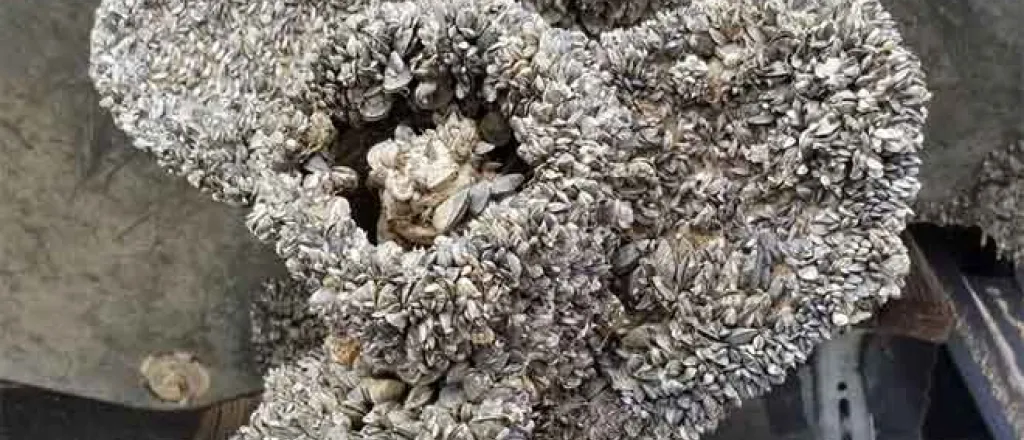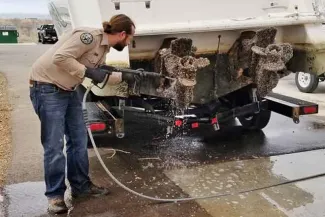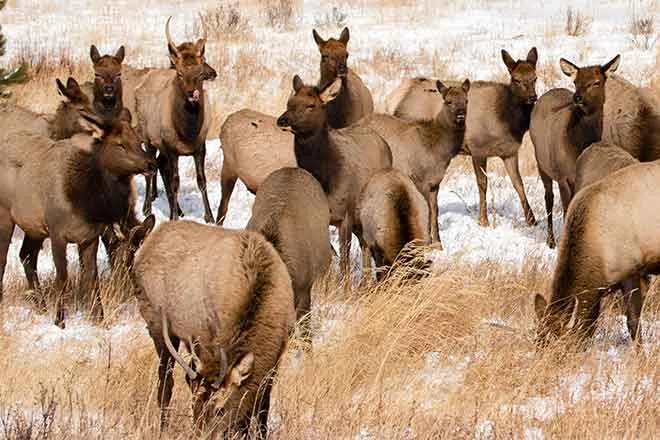
Neguse, Bennet bill aims to slow spread of invasive zebra mussels detected in Colorado River
U.S. Representative Joe Neguse introduced legislation Tuesday aimed at boosting efforts to slow the spread of highly invasive aquatic species in waterways across Colorado and the West, following the detection of zebra mussels in several locations on the Western Slope this summer.
Neguse’s Stop the Spread of Invasive Mussels Act mirrors bipartisan legislation being sponsored in the Senate by U.S. Senator Michael Bennet, a Colorado Democrat, and Montana Republican Senator Steve Daines. Bennet and Daines have introduced several versions of the bill dating back to 2019.

Joe Neguse
Colorado Parks and Wildlife announced in July that testing had confirmed the presence of zebra mussel larvae, known as veligers, in the Colorado River and in the Government Highline Canal near Grand Junction. The species poses an “extreme risk” to water ecosystems because it strips plankton, an essential food source, from the water. Adult zebra mussels can also threaten water supplies and irrigation systems by impeding or stopping water flows and attaching to infrastructure, causing millions of dollars in damages and increased maintenance costs.
“Invasive species are costly and pose significant threats to our ecosystems,” Neguse, a Democrat from Lafayette, said in a statement. “I am proud to work alongside Senator Bennet on the Stop the Spread of Invasive Mussels Act to help protect waters in Colorado and across the Rocky Mountain West. We must safeguard our water supply and work to prevent these aquatic species from doing greater harm to our infrastructure and ecosystems.”
Zebra mussels, which are native to the Black and Caspian seas, are “almost impossible to eradicate” once a population is established, CPW officials say. The species has impacted ecosystems in the Great Lakes region since the late 1980s, and has subsequently spread throughout many parts of the United States by attaching to boats and other aquatic equipment.
The legislation sponsored by Bennet and Neguse aims to strengthen coordination between federal and state agencies responding to the spread of invasive species, including by giving the U.S. Bureau of Reclamation the authority to fund response programs, improving data sharing and ensuring that “at-risk basins are eligible and prioritized for watercraft inspection and decontamination funding,” Neguse’s office said.

Boat inspection to identify mussel infested boats. Courtesy CPW
CPW has redoubled efforts to educate Colorado boaters about the threat posed by zebra mussels. Anyone using the Colorado River or nearby bodies of water is urged to clean, drain, and dry their vessels and equipment — including boats, rafts, kayaks, paddle boards and fishing equipment — after they leave the water. A 10-second high-pressure spray of hot water is enough to kill and remove zebra mussels that have attached to a boat.
Colorado’s first confirmed zebra mussel infestation was detected at Highline Lake State Park near the Colorado-Utah border in 2022. A monitoring program put in place following that discovery subsequently detected veligers in July 2024 at several locations upstream of the lake in the Government Highline Canal, a 55-mile-long irrigation project that diverts Colorado River water to farms in the Grand Valley, as well as in the Colorado River itself.
After unsuccessful efforts to eradicate the species in Highline Lake, CPW closed it for the 2024 boating season and gradually drained it over the course of the year. The lakebed will be kept empty over the winter in attempt to kill off any remaining mussels, but the agency anticipates it will be filled and open for the 2025 season, with strict decontamination protocols in place.
The agency said in an update last week that no additional veligers or adult mussels have been found in the Colorado River or the Highline Canal since the initial detection in July.
“While we have concluded our sampling efforts for the year, our work is not done,” said Robert Walters, CPW’s invasive species program manager. “Staff will continue to look for opportunities to educate the public on simple steps to prevent the spread of zebra mussels or any invasive species in Colorado waters.”
“Representative Neguse’s legislation is needed now more than ever to protect our state’s waterways and critical infrastructure,” Dan Gibbs, executive director of the Colorado Department of Natural Resources, said in a statement. “We commend Representative Neguse for being a continued champion of legislation to expand collaboration between state and federal partners, which will be critical to preventing these harmful species from further taking root in western rivers.”
Colorado Newsline is part of States Newsroom, a nonprofit news network supported by grants and a coalition of donors as a 501c(3) public charity. Colorado Newsline maintains editorial independence. Contact Editor Quentin Young for questions: info@coloradonewsline.com. Follow Colorado Newsline on Facebook and X.

















